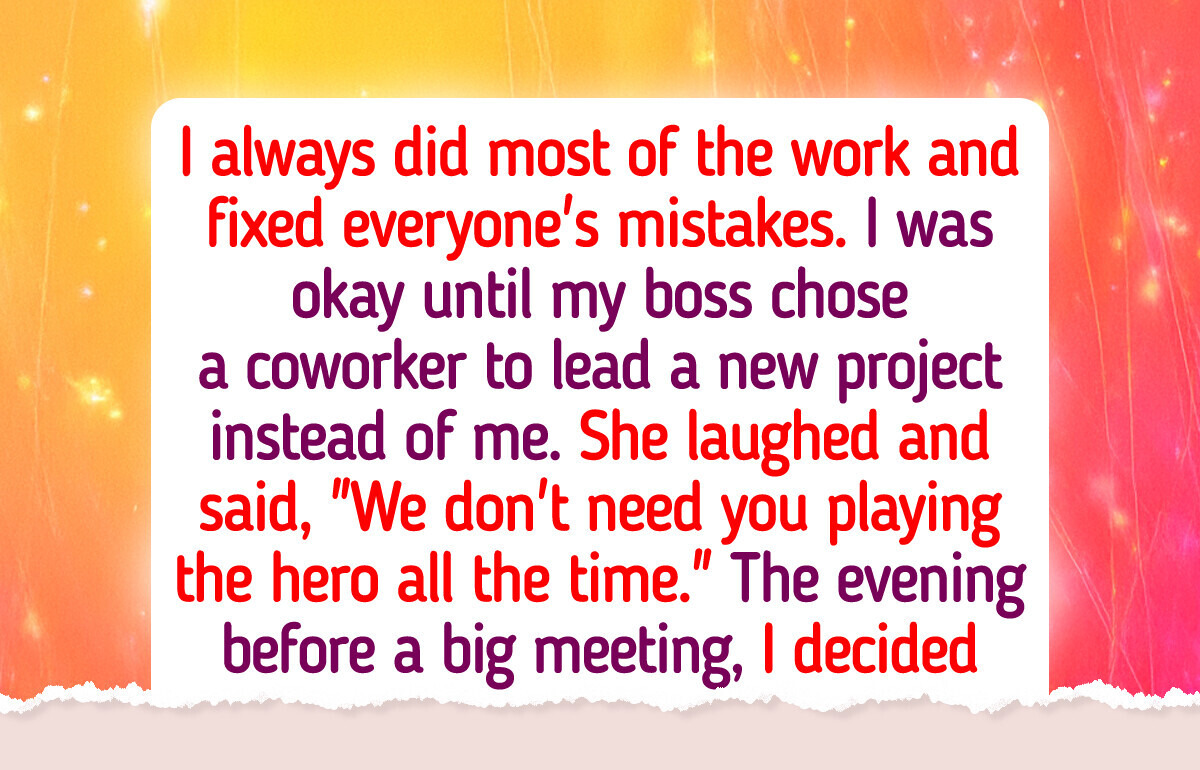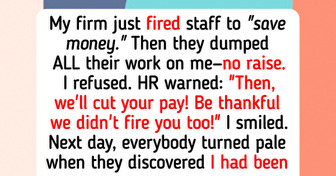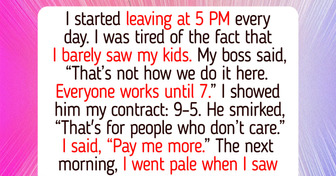Document everything before you go to your supervisor. This has the potential to blow up in your face. Tread carefully. Good luck.
My Boss Tried to Humiliate Me, but I Turned the Tables

Working hard to the bone and not getting what you deserve can make anyone feel frustrated. That’s the case for Clara. After putting in extra hours of work and compromising her work-life balance, she was rewarded with little recognition, but fortunately, karma redeemed her.
Here’s Clara’s story.
Dear Bright Side,
I work at a marketing agency, and I’ve been pulling in everyone’s work. I’ve put in extra hours and help just to make everyone’s lives easier, and I did it because I love my job. I was eyeing a leadership position for the next new project.
That is, until my boss chose Rachel to lead it instead of me. I was upset, but still cheered for her, even though I knew she wasn’t qualified for it. Her comment made me feel worse as she laughed and said, “We don’t need you playing the hero all the time.”
The evening before a big meeting, I decided to step back and let Rachel fail on her own. When the project stumbled due to her lack of preparation, I watched it all unfold. By the time Rachel was scrambling to fix things, my boss was already calling me into her office.
“You’re taking over,” she said. “It’s yours now.”
Once I took the job, Rachel’s been glaring at me all week. A problem arose when the client complained about a tiny detail in my submission, and I realized then that it was Rachel’s doing. She was trying to sabotage my work.
Should I take this up to management or face her one-on-one?
Clara S.
Go for the one-on-one option instead.
Thank you for sharing your story, Clara. In this case, going one-on-one with Rachel is your best bet at avoiding escalations. Going over her head immediately with an accusation, without proof, could make you look petty, paranoid, or like you can’t handle interpersonal conflicts, which is a key leadership skill.
Keep the conversation professional.
Start the conversation by focusing on the work. Say something like, “Rachel, I was reviewing the client’s feedback and noticed an error in a file you had worked on. I wanted to check in with you directly to see if you had any context for how that might have happened?”
Stay calm and don’t accuse her straight away. Her reaction will tell you everything you need to know.
If things escalate, it’s time to go to management.
If she admits fault or backs down, consider the issue resolved for now. If she denies it or becomes hostile, then you can collect the evidence of her poor performance and head to management. Frame it around the project’s risk, present the facts, and note that you addressed it with her first.
As a leader, your role is to build your project and ensure everyone has a part to play. If someone isn’t cooperating, then you need to always handle it professionally. Luckily, there are many ways you can deal with difficult people at work that you can learn about here.
Comments
No, not HR yet. I would go to her and ask her what her malfunction was. I was out of her way. Thank her for reminding you you did not always have to be the hero, but warn her that you have kept notes and if she pulls this again, you will both be in HR and only one will leave with a job. When they find she is sabotaging someone else's work after screwing up that bad, my money is on her.
Related Reads
17 Stories That Prove Living in an Apartment Building Is a Sitcom You Never Auditioned For

20+ Moments That Prove Happiness Is Not About the Big Things

I Refused to Do Extra Work Without a Raise — Now HR Will Cut My Salary

I Refused to Help My Homeless Mom After She Spent All My Inheritance on My Sick Sister

13 Stories of Quiet Kindness That Show Superhuman Strength in Ordinary People

I Refused to Knit My Coworker a Free Blanket, and Now HR Is Involved

14 Dates That Started Like Movies but Ended Like Sitcoms

15 Stories That Inspire Us to Stay Kind Even When Life Feels Unfair

16 Times Roommate Situations Took an Unexpected Turn

I Started Leaving at 5 PM Sharp, Now My Boss Questions My Dedication

I Chose My Sick Son Over a Client Meeting—Now I’m Under Review

15+ People Who Went Shopping for Clothes and Ended Up Starring in Their Own Personal Sitcom



